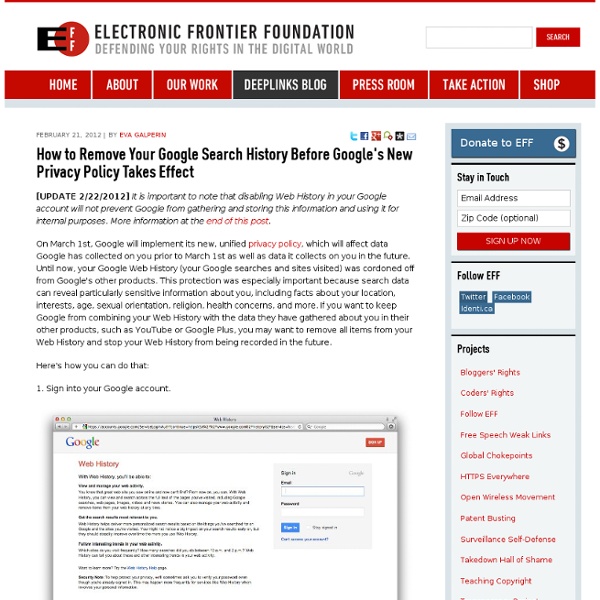How to Remove Your Google Search History Before Google's New Privacy Policy Takes Effect
[UPDATE 2/22/2012] It is important to note that disabling Web History in your Google account will not prevent Google from gathering and storing this information and using it for internal purposes. More information at the end of this post. On March 1st, Google will implement its new, unified privacy policy, which will affect data Google has collected on you prior to March 1st as well as data it collects on you in the future. Until now, your Google Web History (your Google searches and sites visited) was cordoned off from Google's other products. Here's how you can do that: 1. 2. 3. 4. Note that removing your Web History also pauses it. [UPDATE 2/22/2012]: Note that disabling Web History in your Google account will not prevent Google from gathering and storing this information and using it for internal purposes. If you have several Google accounts, you will need to do this for each of them.
Signes des Temps - Les Nouvelles pour lun., 23 jan. 2012
15 Online Tools that You Will Come to Love as a Tech | EmergingTechs.com - StumbleUpon
I have compiled a list of 15 free online tools that will help you greatly as a tech. I’m sure that there are other good ones that I have left out so please feel free to post the ones that you like as well. IPTools offers a wide variety of online networking tools. With this site you can look up IP address information, check spam databases, run pings, run traceroutes, lookup WHOIS information and much more. BugMeNot allows you to find and share logins for sites that require you to register. SpeedTest.net allows you to test your Internet connection speed. Del.icio.us is a social bookmarking site that allows you to bookmark sites and view them from any computer. Omnidrive is an online storage service that allows you to upload large files, access them from any computer, and share them with other people. 10 Minute Mail allows you to create temporary email addresses that expire after 10 minutes. Free Password GeneratorFree Password Generator generates very strong and unique passwords.
Chem Trails
Does this look like a NORMAL sky to you? What about the flight pattern? Or how about this, does the following sky and flight path look normal? For several years since 2001 the existence of an unusual type of aerial spraying activity has been observed and reported, generally termed "Chemtrails". Chemtrails differ from typical aero contrails in their high degree of persistence and subsequent spreading, as if a substance had been released. Some of these substances have been identified by researchers. Essentially the evidence and data gathered by many has proven that they are witnessing something out of the ordinary, beyond an ordinary contrail. The Chemtrail/Geo-Engineering Coverup Revealed. Project Cloverleaf Pt 1 Well now this article is especially for the skeptics and non-believers that think chemtrails are merely water vapour or exhaust from airliners and even contrails, think again. chemtrailsuk.net Weather Wars: Death From Above - Alex Jones Tv US Patent - 3,813875 US Patent - 5,003186
cl1p.net - The internet clipboard
Former airline pilot speaks out - Chemtrail Central Forum
posted 01-07-2003 01:04 PM Chem-trails are NOT a myth. I should know as I was an airline pilot for a major carrier before the recent rash of layoffs left me without a job or an income. As many other airline pilots, I started my flying career in the military. The program functions generally as follows: The desired chemical agents (which I will cover in detail soon) are integrated into the jet fuel itself by the large oil companies at their refineries. The military and "civilian" airline programs are very similar, so I will only cover the airline program in detail here. It all starts with the flight plan. Ok, so how do the pilots actually perform this spraying since, as many debunkers point out, there are no controls for the spraying in the cockpit? I - General purpose psychological control agent. As you might guess, type I is used most frequently over wide sparsely populated areas. Getting back to the pilots, this is how the operation continues.
Coding Horror
Emplacement des stations HAARP dans le monde
Petit Rappel: Le projet HAARP (High frequency Active Auroral Research Program) (« programme de recherche sur les aurores boréales en haute atmosphère »), nom créé pour ne faire peur à personne et avec un budget apparemment pas trop élevé (30 millions de dollars par an officiellement). HAARP vue sur le Mt Sanford Le projet HAARP est un programme américain scientifique et militaire de recherche sur l’ionosphère. HAARP est le 3ème site de recherche ionosphérique américain. D’autres installations telles que HAARP existent dans le monde comme la station européenne EISCAT avec une puissance de 1000 MW (ERP) et qui est situé près de Tromsø en Norvège. Les installations du HAARP utilisent la technologie IRI (Ionospheric Research Instrument) ainsi que des techniques radioélectriques afin de modifier localement l’ionosphère par excitation via des ondes haute fréquence (HF) et ce, afin d’étudier les modifications sur les communication longues distances.
Emergency IP List
SOPA Emergency IP list: So if these ass-fucks in DC decide to ruin the internet, here’s how to access your favorite sites in the event of a DNS takedown tumblr.com 174.121.194.34 wikipedia.org 208.80.152.201 # News bbc.co.uk 212.58.241.131 aljazeera.com 198.78.201.252 # Social media reddit.com 72.247.244.88 imgur.com 173.231.140.219 google.com 74.125.157.99 youtube.com 74.125.65.91 yahoo.com 98.137.149.56 hotmail.com 65.55.72.135 bing.com 65.55.175.254 digg.com 64.191.203.30 theonion.com 97.107.137.164 hush.com 65.39.178.43 gamespot.com 216.239.113.172 ign.com 69.10.25.46 cracked.com 98.124.248.77 sidereel.com 144.198.29.112 github.com 207.97.227.239 # Torrent sites thepiratebay.org 194.71.107.15 mininova.com 80.94.76.5 btjunkie.com 93.158.65.211 demonoid.com 62.149.24.66 demonoid.me 62.149.24.67 # Social networking facebook.com 69.171.224.11 twitter.com 199.59.149.230 tumblr.com 174.121.194.34 livejournal.com 209.200.154.225 dreamwidth.org 69.174.244.50
Related:
Related:



